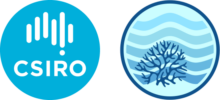Vocabularies
For the purposes consistent data publication and enhancing access, discoverability, integration and aggregation of the various datasets, Data Provider Nodes (DPNs) need to configure services to link to Water Quality vocabulary URIs for definitions and metadata.
A water quality (WQ) vocabulary has been developed based on the Bioregional Assessment (Simons, et al 2013a) and eReefs requirements.
The Water Quality vocabulary is modelled as a formal ontology using the concepts specified in Open Geospatial Consortium Observations and Measurements v1.0 (Cox, 2007) and Quantities, Units, Dimensions and Data Types in OWL and XML (QUDT; Hodgson and Keller, 2011).
The WQ vocabulary is now available for use and a series of conventions for linking to standard vocabularies have been developed. In essence, these conventions provide mechanisms for “injecting” vocabulary URIs (Uniform Resource Identifier) into existing data services. The result of this is that alongside non-standard or standard terms such as “total_suspended_solid”, which is a CF (Climate and Forecast) compliant term, datasets can also contain URIs such as http://environment.data.gov.au/def/property/solids-total_suspended. The benefit of this is that the URI provides a resolvable web address which holds more information about the term, such as a preferred label, in this case “total suspended solids”. More importantly, these URIs can be visited by people using web browsers (such as the link above) or accessed by machines in machine readable formats such as JSON, RDF and others (e.g. http://environment.data.gov.au/def/property/solids-total_suspended?_format=rdf). This means that client tools and user interfaces can be built to automatically make use of this information, greatly increasing the ability to bring together data products from different data providers.
Detailed information about the development of the WQ vocabulary is available on the CSIRO eReefs Wiki.
The list of URIs for the respective classes are:
| SubstanceOrTaxon http://environment.data.gov.au/water/quality/def/op#SubstanceOrTaxon |
| PropertyKind http://environment.data.gov.au/water/quality/def/op#PropertyKind (where the quantity kind does not necessarily have a unit of measure associated with it, e.g. categories of things, categoricals) |
| ScaledQuantityKind http://environment.data.gov.au/water/quality/def/op#ScaledQuantityKind (where the quantity kind has a unit of measure associated with it) |
| QuantityKind http://qudt.org/schema/qudt#QuantityKind (a QUDT equivalent class to ScaledQuantityKind without the qudt:unit property) |
| Unit http://qudt.org/schema/qudt#Unit or http://environment.data.gov.au/water/quality/def/unit/ |
References
| Cox, S. J. D. (ed.), 2007. Observations and Measurements – Part 1 – Observation schema. OGC 07-022r1. Open Geospatial Consortium Inc. |
| Cox, S.J.D., Simons, B.A. (2014) WaterML-WQ – an O&M and WaterML 2.0 profile for water quality data. Wayland Mass. USA: Open Geospatial Consortium; 2014. |
| Cox, S.J.D., Simons, B.A. and Yu, J. (2014a). A Harmonized Vocabulary For Water Quality. In: Michael Piasecki, editor. HIC2014 – 11th International Conference on Hydroinformatics; 17-21 August 2014; CCNY, New York, USA. New York: City College of New York; 2014, pp1454-1459. |
| Cox, S., Yu, J. and Rankine, T., (2014b) SISSVoc: A Linked Data API for SKOS vocabularies, Semantic Web, vol. 7, no. 1, pp. 9-24. DOI: 10.3233/SW-140166. |
| Hodgson R. and Keller, P. J., 2011. QUDT: Quantities, Units, Dimensions and Data Types in OWL and XML. NASA. Accessed at https://www.qudt.org/on 26 February 2013. Downloaded from http://linkedmodel.org/catalog/qudt/1.1/ on 26 February 2013 |
| Simons, B.A, Yu, J. and Cox, S. J.D., (2013a) Water Quality vocabularies for the Bioregional Assessment Framework. Water for a Healthy Country Flagship Report series ISSN: 1835-095X |
| Simons, B.A., Yu, J., Cox, S.J.D., (2013b) Defining a water quality ontology using QUDT and ChEBI. In: Piantadosi J, Anderssen RS and Boland J, editors. MODSIM2013, 20th International Congress on Modelling and Simulation; December 2013; Adelaide. Modelling and Simulation Society of Australia and New Zealand; 2013, pp2548–2554. |
| Yu, J., Simons, B.A., Car, N., Cox, S.J.D. (2014). Enhancing water quality data service discovery and access using standard vocabularies. In: Michael Piasecki, editor. HIC2014 – 11th International Conference on Hydroinformatics; 17-21 August 2014; CCNY, New York, USA. New York: City College of New York; 2014, pp1181-1188. |
